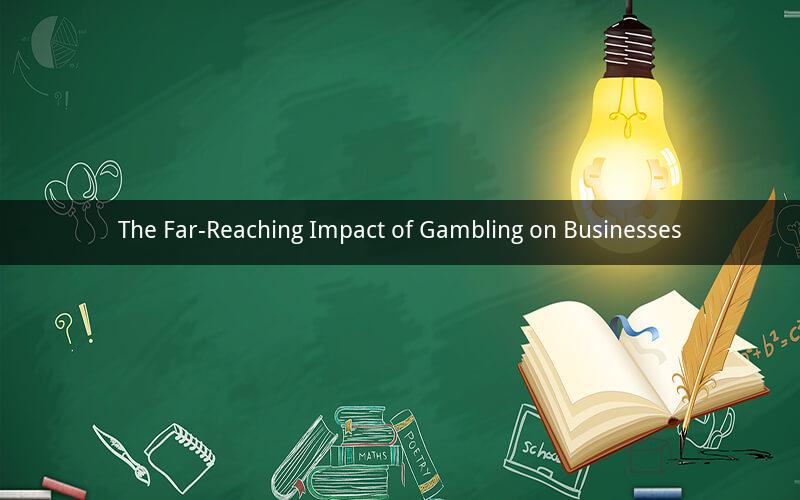
Gambling, a controversial and often regulated industry, has the power to significantly impact businesses in various ways. From the rise of online gambling platforms to the opening of land-based casinos, the effects of gambling on businesses are both profound and multifaceted. This article delves into how gambling affects businesses, focusing on economic, social, and legal dimensions.
1. Economic Impact
Gambling can have a substantial economic impact on businesses. The primary economic effect is the revenue generated through gambling activities. Casinos, sportsbooks, and online gambling platforms generate billions of dollars annually. This revenue can be used for investment, expansion, or simply as additional profit for the business. However, the economic impact of gambling goes beyond mere revenue generation.
1.1 Job Creation
The gambling industry creates numerous jobs, both directly and indirectly. Casinos, sportsbooks, and online gambling platforms require a wide range of skilled professionals, from croupiers and waitstaff to software developers and marketing specialists. This job creation can have a positive economic impact on local communities, as well as on the businesses that supply goods and services to the gambling industry.
1.2 Attraction of Investment
The potential for high revenue and job creation makes the gambling industry an attractive investment opportunity for businesses. Investors are drawn to the industry's growth potential, leading to increased competition and innovation. This can benefit other businesses in the community, as they may experience increased economic activity and a more skilled workforce.
2. Social Impact
The social impact of gambling on businesses is a complex issue, as it encompasses both positive and negative outcomes. While gambling can bring economic benefits, it can also lead to social problems, which may ultimately harm businesses.
2.1 Increased Crime Rates
The presence of gambling facilities can lead to increased crime rates, including theft, fraud, and money laundering. This can harm local businesses, as higher crime rates can lead to decreased consumer confidence and spending. Businesses may also have to invest in increased security measures to protect their employees and customers.
2.2 Problem Gambling
Problem gambling can have a detrimental impact on individuals and communities, leading to financial, social, and psychological problems. Businesses may suffer as a result of this issue, as employees with gambling problems may be less productive or even lose their jobs. Additionally, problem gambling can lead to increased demand for social services, which can put a strain on businesses that rely on these services.
3. Legal Impact
The legal impact of gambling on businesses is an essential consideration, as the industry is heavily regulated in many countries. The laws and regulations surrounding gambling can vary significantly, and businesses must navigate this complex landscape to remain compliant.
3.1 Compliance Costs
Compliance with gambling regulations can be expensive for businesses. They must invest in legal advice, licensing fees, and other costs associated with operating within the legal framework. However, compliance can also provide a competitive advantage, as businesses that adhere to regulations may be perceived as more reputable and trustworthy.
3.2 Market Access
The legal environment can impact businesses' ability to enter the gambling market. In some regions, strict regulations may make it difficult for new entrants to gain access to the market, while in others, the market may be saturated with competitors. Understanding the legal landscape is crucial for businesses looking to expand into the gambling industry.
Frequently Asked Questions
1. What is the primary economic impact of gambling on businesses?
- The primary economic impact of gambling on businesses is the revenue generated through gambling activities, which can be used for investment, expansion, or profit.
2. How does gambling affect job creation?
- Gambling can create numerous jobs, both directly and indirectly, as casinos, sportsbooks, and online gambling platforms require a wide range of skilled professionals.
3. Can gambling lead to increased crime rates?
- Yes, the presence of gambling facilities can lead to increased crime rates, including theft, fraud, and money laundering, which can harm local businesses.
4. How does problem gambling affect businesses?
- Problem gambling can harm businesses by leading to decreased employee productivity, increased demand for social services, and decreased consumer confidence.
5. What are the challenges of navigating the legal landscape of the gambling industry?
- Navigating the legal landscape of the gambling industry can be challenging due to varying regulations, compliance costs, and the potential for market saturation. Businesses must invest in legal advice and ensure they adhere to the legal framework to remain compliant.